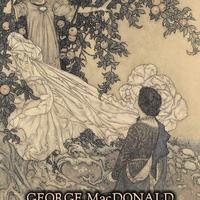XVI. An Evil Nurse
WATHO was herself ill, as I have said, and was the worse tempered; and besides, it is a peculiarity of witches that what works in others to sympathy works in them to repulsion. Also, Watho had a poor, helpless, rudimentary spleen of a conscience left, just enough to make her uncomfortable, and therefore more wicked. So, when she heard that Photogen was ill, she was angry. Ill, indeed! after all she had done to saturate him with the life of the system, with the solar might itself? He was a wretched failure, the boy! And because he was her failure, she was annoyed with him, began to dislike him, grew to hate him. She looked on him as a painter might upon a picture, or a poet upon a poem, which he had only succeeded in getting into an irrecoverable mess. In the hearts of witches, love and hate lie close together, and often tumble over each other. And whether it was that her failure with Photogen foiled also her plans in regard to Nycteris, or that her illness made her yet more of a devil's wife, certainly Watho now got sick of the girl too, and hated to know her about the castle. She was not too ill, however, to go to poor Photogen's room and torment him. She told him she hated him like a serpent, and hissed like one as she said it, looking very sharp in the nose and chin, and flat in the forehead. Photogen thought she meant to kill him, and hardly ventured to take anything brought him. She ordered every ray of light to be shut out of his room; but by means of this he got a little used to the darkness. She would take one of his arrows, and now tickle him with the feather end of it, now prick him with the point till the blood ran down. What she meant finally I cannot tell, but she brought Photogen speedily to the determination of making his escape from the castle: what he should do then he would think afterwards. Who could tell but he might find his mother somewhere beyond the forest! If it were not for the broad patches of darkness that divided day from day, he would fear nothing!
But now, as he lay helpless in the dark, ever and anon would come dawning through it the face of the lovely creature who on that first awful night nursed him so sweetly: was he never to see her again? If she was, as he had concluded, the nymph of the river, why had she not reappeared? She might have taught him not to fear the night, for plainly she had no fear of it herself! But then, when the day came, she did seem frightened -- why was that, seeing there was nothing to be afraid of then? Perhaps one so much at home in the darkness was correspondingly afraid of the light! Then his selfish joy at the rising of the sun, blinding him to her condition, had made him behave to her, in ill return for her kindness, as cruelly as Watho behaved to him! How sweet and dear and lovely she was! If there were wild beasts that came out only at night, and were afraid of the light, why should there not be girls too, made the same way -- who could not endure the light, as he could not bear the darkness? If only he could find her again! Ah, how differently he would behave to her! But alas! perhaps the sun had killed her -- melted her -- burned her up! -- dried her up -- that was it, if she was the nymph of the river!

